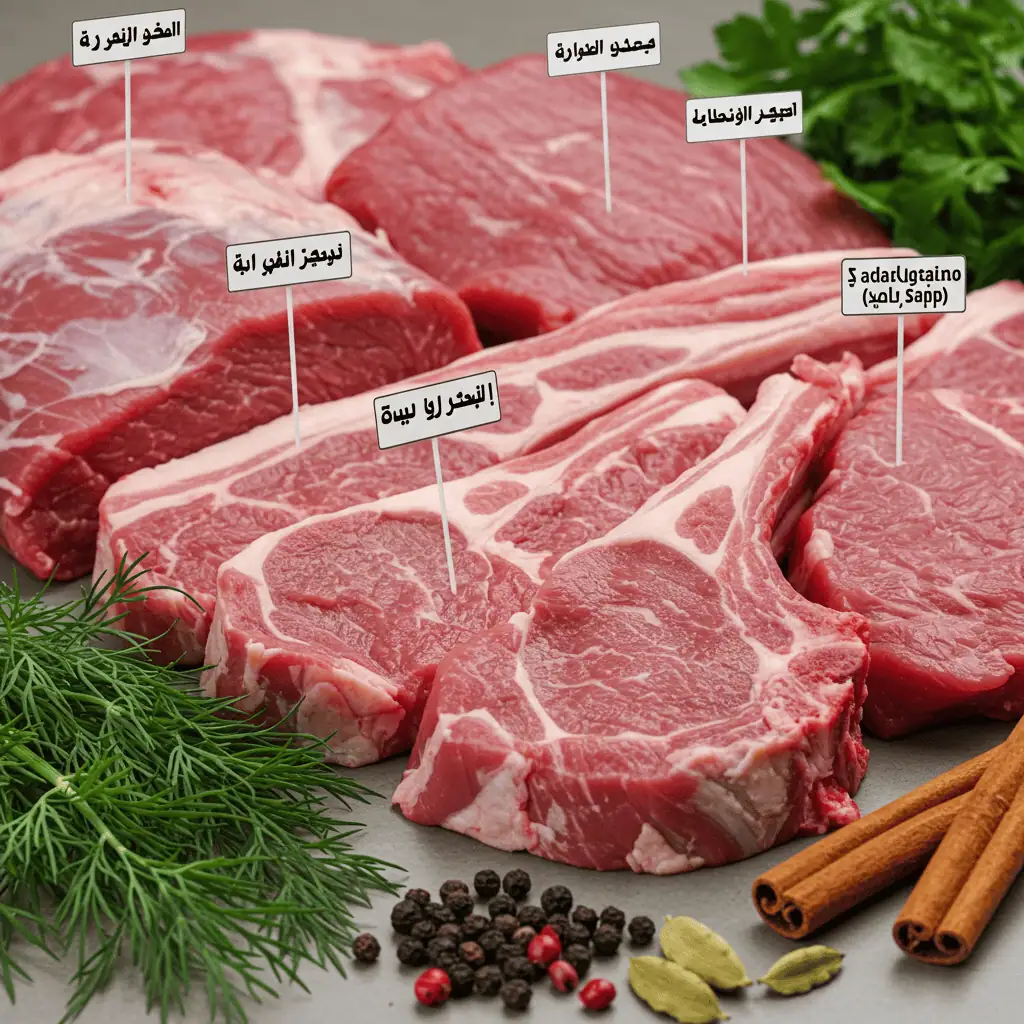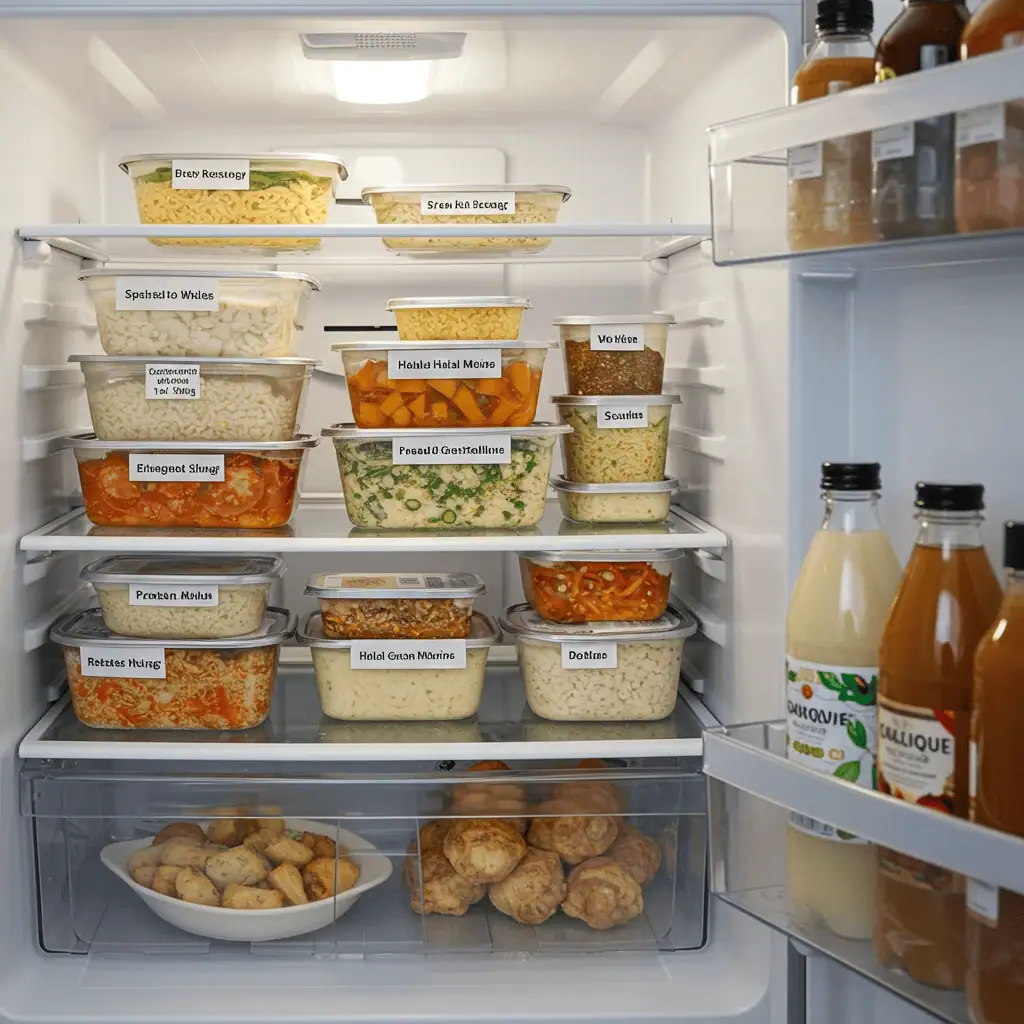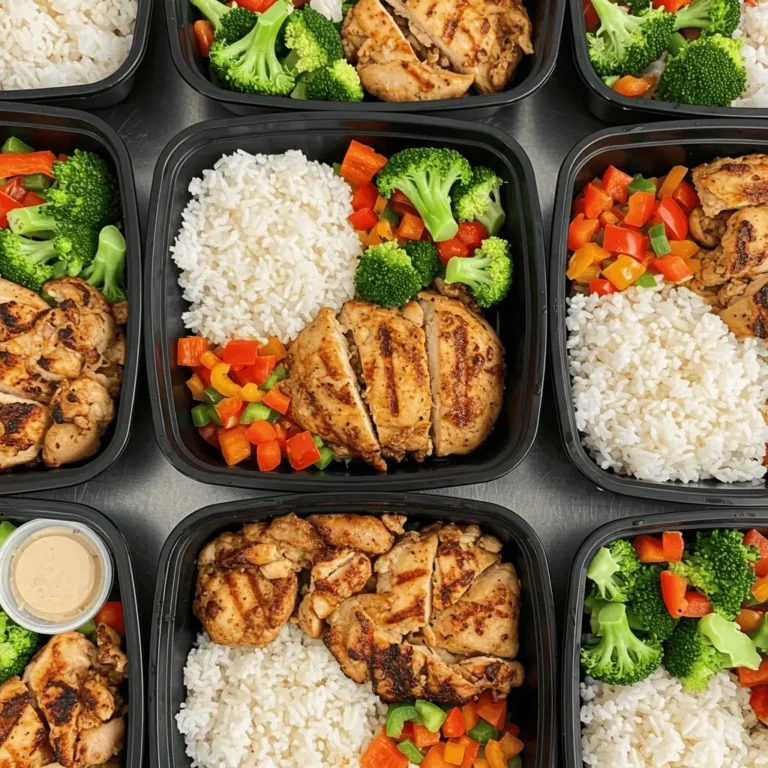Introduction: Embracing Halal Food Prep Meals in Everyday Life
In today’s fast-paced world, convenience often trumps quality. But for many health-conscious consumers, especially those following a faith-based lifestyle, finding quick yet authentic halal food prep meals can be a challenge. This comprehensive guide dives into everything you need to know—from understanding halal standards to meal planning, storing, and reheating. Whether you’re new to halal food prep or seeking better ways to organize your week with nutritious, certified options, we’ve got you covered.
able of Contents
Looking for inspiration? Try our halal chicken recipe ideas for your next prep session.
Understanding Halal Food Prep Meals
What Does “Halal” Mean in Meal Prep?
The word halal simply means “permissible” in Arabic. When applied to food, it refers to dietary standards set by Islamic law. For meal prep, this means not only choosing halal-certified meats but also ensuring all ingredients, preparation tools, and cooking methods align with halal principles.
In the context of meal prepping, halal compliance extends beyond avoiding pork or alcohol—it includes sourcing meat that has been slaughtered in a specific manner (Zabiha), using utensils not cross-contaminated with non-halal items, and ensuring packaged or processed goods are free from haram (forbidden) additives such as gelatin or certain enzymes.
The Rise of Halal Food Prep Services in the U.S.
Halal food is not just a niche anymore—it’s a booming sector in the U.S. food industry. With over 3.5 million Muslims in America, halal food prep meal services have seen a sharp rise. Many mainstream and boutique services now offer halal-certified kits and delivery options, making it easier for Muslim consumers to stick to their dietary guidelines without sacrificing taste or convenience.
Discover great ideas like our halal recipes for dinner to elevate your evening meals with ease.
Major platforms are recognizing the market demand. While companies like HelloFresh don’t offer a fully halal version yet, there are new brands and local chefs stepping up to fill this important need.
Why Choose Halal Food Prep Meals?
Health Benefits of Halal Meal Prep Options
Halal food prep meals are more than just religiously compliant—they’re inherently cleaner and often healthier. The halal slaughter process ensures that animals are treated humanely and bled thoroughly, reducing the risk of bacteria growth in meat. Additionally, halal certification discourages the use of artificial preservatives, synthetic additives, and overly processed ingredients, resulting in meals that are naturally fresher and more wholesome.
This cleaner ingredient list often leads to better digestion and less exposure to harmful substances. In many halal prep meals, lean proteins like chicken and fish take center stage, paired with fiber-rich vegetables and heart-healthy fats. This kind of balanced nutrition supports everything from muscle growth to weight management and overall wellness.
Don’t miss our halal BBQ recipes for protein-packed options that keep your meal prep exciting and flavorful.
Ethical and Spiritual Aspects of Halal Eating
Beyond nutrition, halal food represents a spiritual commitment. Every aspect of halal meal prep—from choosing certified ingredients to the prayer said at the time of animal slaughter—is rooted in mindfulness and gratitude. For Muslims, it’s a form of worship, a daily reaffirmation of their faith and values.
Even non-Muslims are embracing halal for its emphasis on ethical sourcing and humane treatment of animals. The principles behind halal preparation often overlap with sustainable eating practices—like using organic, locally sourced ingredients and minimizing waste.
By choosing halal food prep meals, you’re not just choosing what to eat—you’re choosing how your food is raised, prepared, and respected throughout the process.
Check out our halal smash burger guide for a modern take on ethical eating with bold flavors.
Halal Certification and Ingredients
How to Identify Certified Halal Ingredients
When preparing halal food prep meals, ingredient selection is everything. Look for products that carry a recognized halal certification seal, such as those from the Islamic Food and Nutrition Council of America (IFANCA) or the Halal Food Authority (HFA). These certifications ensure the product complies with Islamic dietary laws—this includes everything from how meat is sourced and slaughtered to the handling and packaging of food.
Reading labels becomes second nature when meal prepping with halal in mind. Some brands may use “halal” in marketing without formal certification, so always verify through reliable certification bodies. It’s also a smart move to use dedicated apps like Scan Halal or websites with updated halal product databases to confirm ingredient status on the go.
Discover great ideas like these halal-friendly staples in our smart kitchen tools for healthier cooking article—they’ll make prep both efficient and compliant.
Common Non-Halal Additives to Avoid in Meal Prepping
Even the healthiest-looking ingredients can contain hidden haram substances. These are some of the most common culprits to look out for:
| Additive | Why It’s Haram |
|---|---|
| Gelatin | Often derived from non-halal animal sources |
| L-Cysteine | Derived from human hair or hog hair |
| Rennet | May come from non-halal slaughtered animals |
| Alcohol-Based Flavors | Contains ethanol, not permissible |
| Glycerin | May be animal-based if not vegetable-derived |
These ingredients frequently appear in sauces, snacks, seasoning packets, and even bread. Always opt for whole, raw ingredients where possible and stick to brands that clearly label their products as halal-certified.
To deepen your understanding, check out our article on authentic bolognese sauce recipe guide and learn how to adapt classic recipes with halal substitutes.
Meal Planning for Halal Diets
Weekly Halal Meal Prep Strategies for Busy Families
For anyone juggling work, school, or family, planning your meals ahead of time is key—and when you’re keeping halal, it’s even more crucial to stay organized. Weekly halal meal planning ensures that you have everything you need on hand and that you avoid last-minute decisions that might lead to non-compliant choices.
Here’s how to set up a successful weekly halal meal plan:
- Plan Meals by Protein Source: Rotate halal proteins like chicken, beef, lamb, and fish throughout the week. For example:
- Monday: Halal chicken wraps
- Tuesday: Spiced lamb and rice bowls
- Wednesday: Grilled fish with quinoa
- Batch Cook & Freeze: Prepare large portions of base ingredients—grains, meats, legumes—and freeze them in portions to save time during the week.
- Use a Template: Stick to a meal framework (Protein + Grain + Veg + Sauce) to reduce decision fatigue.
- Shop Smart: Make a grocery list based on your planned meals and double-check halal certifications on all packaged items.
- Label Everything: Clearly mark containers with prep dates and contents to stay on track and reduce food waste.
Looking for inspiration? Try our halal chicken recipe again—it’s great for batch cooking and works for wraps, bowls, and more.
Best Containers and Tools for Halal Food Storage
Efficient storage is essential to maintaining the quality, safety, and halal integrity of your meals. Cross-contamination with non-halal items can occur if containers aren’t used mindfully.
Here are the top storage essentials for halal food prep:
| Tool | Purpose |
|---|---|
| Glass Meal Prep Containers | Safe for reheating and keeps flavors intact |
| BPA-Free Plastic Containers | Lightweight and portion-controlled |
| Labeling Tape & Markers | Helps track prep and expiration dates |
| Vacuum Sealer | Keeps meat fresh longer and prevents freezer burn |
| Divided Bento Boxes | Ideal for keeping foods separate and uncontaminated |
For best results, dedicate specific containers and cooking tools to halal meal prep only, especially in mixed-diet households.
Halal Protein Sources and Substitutes

Popular Halal Meat Options and Alternatives
When prepping meals with a focus on halal, protein variety is key—not only for taste but for nutritional balance. The most commonly used halal proteins include:
- Chicken (Zabiha-certified): A lean and versatile protein that’s a staple in halal food prep.
- Beef and Lamb: Rich in iron and flavor, great for stews, grills, and kebabs.
- Fish and Seafood: Most are naturally halal and provide essential omega-3 fatty acids.
To ensure your meat is truly halal, always look for Zabiha-certified labels from recognized authorities and avoid meats labeled ambiguously or sold without certification.
Here’s a quick reference for halal meat comparison:
| Protein | Benefits | Popular Uses |
|---|---|---|
| Chicken | Low-fat, high-protein | Curries, wraps, salads |
| Lamb | High in iron, rich flavor | Kebabs, biryanis, slow-cooked |
| Beef | Great for muscle building | Meatballs, steaks, tacos |
| Fish | Heart-healthy, easy to cook | Grilled, baked, fish curry |
Don’t miss our halal smash burger guide to turn halal ground beef into an indulgent prep meal.
Plant-Based Halal Protein Sources for Vegan Meal Preps
Halal isn’t limited to meat—plant-based halal meal prepping is gaining ground among vegans and vegetarians looking to align their ethics with their faith. Unlike other diets, halal doesn’t ban plant foods, but it’s important to ensure there are no non-halal additives, especially in processed vegan products.
Top plant-based halal proteins include:
- Lentils & Chickpeas: A protein-rich base for soups, stews, and bowls.
- Tofu & Tempeh: Be sure these are free from alcohol-based marinades or non-halal enzymes.
- Quinoa & Buckwheat: Complete plant-based proteins perfect for meal prep bowls.
- Nut Butters & Seeds: Great for snacks or added to smoothies and sauces.
Make sure any plant-based meat alternatives are labeled halal-certified, especially if flavored or pre-cooked.
By incorporating both animal and plant-based proteins, you can keep your halal meal prep exciting, diverse, and nutritionally balanced.
Top Halal Food Prep Services in the U.S.
Is There a Halal Version of HelloFresh?
One of the most common questions from halal eaters looking to simplify their routines is: “Is there a halal version of HelloFresh?” While HelloFresh does not currently offer fully halal-certified meal kits, several other companies have emerged to fill this gap in the market. These halal meal delivery services are tailored specifically to meet Islamic dietary laws, offering everything from weekly meal kits to frozen entrees.
Here are some alternatives that provide halal meal prep services in the U.S.:
| Service | Features | Delivery Region |
|---|---|---|
| Halal Kitchen | Weekly kits with Zabiha-certified meats and easy recipes | Nationwide (select states) |
| My Halal Kitchen Box | Family-style meal kits with verified halal ingredients | Nationwide |
| AMEERAH Cuisine | Ready-to-eat halal gourmet dishes for busy professionals | Select major U.S. cities |
| Tayyib Foods | Organic halal meats and build-your-own meal kits | East Coast & Midwest |
These companies not only provide convenience but also peace of mind by ensuring every ingredient is halal-compliant. Some even allow you to customize meals for low-carb, diabetic-friendly, or gluten-free preferences.
Check out our halal recipes for dinner to pair with these meal kits for a full week’s plan.
Comparing Top Halal Meal Kit Delivery Services
When choosing a halal food prep meal service, consider the following criteria:
- Halal Certification: Is the company using certified Zabiha meat from recognized halal bodies?
- Ingredient Transparency: Do they list full ingredient info for each meal?
- Menu Variety: Can you select from a range of proteins, spices, and international cuisines?
- Convenience: Are meals pre-portioned and easy to assemble?
- Customization: Do they cater to specific dietary needs like keto or diabetic-friendly?
Let’s compare three leading options:
| Brand | Customization | Halal Cert. | Prep Time | Sample Dish |
|---|---|---|---|---|
| Halal Kitchen | High | IFANCA | 20-30 min | Chicken Tikka Masala Bowl |
| AMEERAH Cuisine | Moderate | Local Imam Approval | 2-3 min microwave | Creamy Butter Chicken |
| Tayyib Foods | Low (bulk meats) | HFSAA | DIY only | Build-your-own stir-fry |
Choosing the right halal meal prep service depends on your lifestyle and commitment to daily cooking vs. reheating. For those who love hands-on cooking, Halal Kitchen might be ideal. If you need fast, microwave-friendly meals, AMEERAH Cuisine delivers big on flavor.
DIY Halal Meal Prep Recipes

Easy Halal Lunch Meal Prep Ideas
Prepping lunch ahead of time is a game-changer for staying on track with a halal diet. These recipes are balanced, flavorful, and perfect for portioning out several days at a time.
1. Grilled Chicken Shawarma Bowls
Use Zabiha-certified chicken thighs marinated in garlic, lemon, and Middle Eastern spices. Serve over rice with roasted vegetables and tahini sauce.
2. Lentil & Spinach Curry with Brown Rice
Packed with fiber and plant-based protein, this dish is 100% halal and vegan. Make a big batch and divide into microwavable containers.
3. Halal Beef Stir-Fry
Quickly sauté thinly sliced halal beef with bell peppers, broccoli, and soy-free teriyaki sauce. Serve with jasmine rice or quinoa.
4. Spiced Chickpea Salad Jars
Layer spiced chickpeas, cucumbers, cherry tomatoes, and olive oil in mason jars for easy grab-and-go lunches that stay fresh all week.
Don’t miss our halal BBQ recipes—you can batch grill meats on Sunday and use them all week in wraps, bowls, or salads.
Dinner-Ready Halal Meals You Can Freeze and Reheat
Dinners are where halal meal prep really shines. With a bit of weekend prep, you can enjoy flavorful, wholesome dinners that align with your faith every night.
1. Halal Chicken Biryani
This fragrant rice dish freezes well and reheats beautifully. Pack in meal prep containers and pair with yogurt or salad.
2. Lamb Kofta with Couscous
Spiced lamb meatballs served over couscous or whole-grain rice are hearty and satisfying. Freeze cooked koftas and reheat as needed.
3. Fish Tagine with Sweet Potatoes
North African spices meet tender white fish and veggies in this slow-simmered dish. Store in glass containers and reheat in the oven.
4. Stuffed Bell Peppers
Fill bell peppers with ground halal beef, brown rice, and tomato sauce. Bake, cool, and freeze for easy weekday meals.
Looking for inspiration? Try our halal chicken recipe to create a base protein you can use across multiple dishes.
These recipes save time, reduce waste, and ensure your meals are always halal and delicious.
Halal Meal Prep for Special Diets
Halal and Keto, Paleo, or Gluten-Free Combinations
Adapting halal food prep meals to match dietary lifestyles like keto, paleo, or gluten-free is not only possible—it’s simple when you know what to look for.
Halal + Keto:
Keto focuses on high-fat, low-carb foods. You can maintain halal compliance while staying in ketosis by choosing:
- Halal-certified beef, lamb, and chicken with high-fat cuts (like chicken thighs)
- Ghee, olive oil, and avocado oil for cooking
- Cauliflower rice, zoodles, and leafy greens as your veggie base
Example Meal: Halal grilled lamb chops with garlic butter broccoli and mashed cauliflower.
Halal + Paleo:
The paleo diet emphasizes unprocessed, whole foods. Most halal-prepped meats and vegetables already fit this bill.
- Focus on fresh halal meats
- Use natural sweeteners like honey or dates
- Avoid dairy and grains, using almond flour or coconut flour instead
Example Meal: Halal chicken breast with roasted root vegetables and avocado salad.
Halal + Gluten-Free:
Many halal meals are naturally gluten-free, especially if you prepare them from scratch.
- Swap wheat with rice, quinoa, or certified gluten-free oats
- Watch out for sauces or spice blends containing wheat derivatives
Example Meal: Quinoa tabbouleh with grilled halal shrimp and tahini dressing.
Discover great ideas like our halal smash burger guide—perfect for a gluten-free burger night using lettuce wraps or GF buns.
Adapting International Recipes to Fit Halal Prep Rules
From Italian to Mexican cuisine, nearly any recipe can be made halal with the right substitutions and methods.
Tips for Adapting Recipes:
- Replace pork with halal turkey bacon, beef, or chicken sausage
- Use halal-certified cheese and yogurt (free of rennet and gelatin)
- Avoid wine, beer, or alcohol-based flavorings—opt for vinegar, lemon juice, or halal-certified alternatives
International Recipe Swaps:
| Cuisine | Traditional Ingredient | Halal Substitute |
|---|---|---|
| Italian | Pancetta/Bacon | Halal beef bacon or turkey strips |
| Mexican | Chorizo | Halal lamb sausage or tofu chorizo |
| French | Wine in cooking | Grape juice or pomegranate juice |
| Asian | Oyster/fish sauce with alcohol | Halal fish sauce or soy-free tamari |
By creatively adjusting ingredients, you can bring the world to your plate while staying halal and true to your dietary needs.
Storing and Reheating Halal Meals Safely
Best Practices for Keeping Halal Meals Fresh
Whether you’re prepping for the week or freezing meals for later, proper storage is essential—not just for flavor, but for maintaining halal integrity. Cross-contamination with non-halal foods or improper storage can compromise your efforts. Follow these best practices to keep your meals fresh, compliant, and delicious:
- Label with Intention
Always label your containers with the meal name and the date it was prepped. Include a “halal” label if storing in a shared fridge to avoid confusion. - Use Airtight Containers
Choose containers that seal completely to prevent moisture loss and protect flavor. Glass containers are ideal for reheating, while BPA-free plastic containers work great for portability. - Divide by Meal
Store meals in single-serve portions. Not only does this make reheating more efficient, but it also minimizes waste. - Follow the 2-4 Rule
Refrigerate meals within two hours of cooking and eat refrigerated items within four days. For freezer meals, use within 2-3 months for best taste and texture. - Separate Meat from Veggies (When Needed)
If you’re using sauces or broths, store them separately to preserve texture and avoid sogginess.
Microwave, Oven, and Stovetop Reheat Methods for Halal Meals
How you reheat your food matters. Not only does it affect taste and texture, but incorrect reheating can also lead to spoilage or safety issues.
| Method | Best For | Tips |
|---|---|---|
| Microwave | Rice dishes, stir-fries, curries | Cover with a damp paper towel to keep food moist |
| Oven | Baked meals, meatloaf, casseroles | Reheat at 350°F, covered with foil to prevent drying out |
| Stovetop | Soups, stews, and skillet meals | Add a splash of water or broth to refresh consistency |
Avoid reheating halal meals in shared appliances that may contain food residue from non-halal items unless they’ve been thoroughly cleaned.
Don’t miss our smart kitchen tools for healthier cooking to upgrade your prep, storage, and reheating process.
Next, we’ll cover your top questions about halal food prep meals before wrapping up with a conclusion and SEO optimization elements.
Frequently Asked Questions About Halal Food Prep Meals
Is there a halal version of HelloFresh?
While HelloFresh does not currently offer a halal-certified option, several U.S.-based meal delivery services specifically cater to halal diets. Brands like Halal Kitchen, AMEERAH Cuisine, and Tayyib Foods offer meal kits and pre-cooked meals that are fully compliant with Islamic dietary laws. These services ensure Zabiha-certified meats, alcohol-free recipes, and ethically sourced ingredients—all hallmarks of true halal food prep.
What are the rules for halal food prep?
Halal food prep follows strict Islamic dietary laws, meaning:
- Only Zabiha-slaughtered meats are allowed.
- Pork and pork-derived ingredients (like gelatin) are strictly forbidden.
- Alcohol and alcohol-based flavorings must be avoided.
- Equipment used must be clean and not cross-contaminated with haram (forbidden) items.
- Even utensils, storage containers, and cooking tools should be dedicated or properly sanitized to maintain halal status.
Is Fresh Prep halal?
Fresh Prep is not a halal-certified meal delivery service. Although they offer vegetarian and clean ingredients, they do not guarantee halal compliance. If you follow a halal diet strictly, it’s best to opt for companies that provide certification from reputable Islamic food authorities or prepare meals at home using known halal ingredients.
What is halal prepared food?
Halal prepared food refers to any ready-to-eat or pre-prepped meal that complies with Islamic dietary rules. This includes:
- Meals cooked using halal-certified meats.
- Foods free from alcohol, pork, and other haram substances.
- Meals cooked with clean, non-contaminated utensils and appliances.
Prepared halal food can be made at home, purchased from restaurants, or delivered by halal-specific meal services.
Conclusion: A Fresh Path to Halal Living Through Meal Prep
Halal food prep meals aren’t just about religious compliance—they offer a lifestyle of mindfulness, wellness, and delicious variety. From sourcing certified ingredients to batch-cooking freezer-friendly meals, halal meal prepping empowers you to take control of your diet while honoring your values. Whether you’re new to halal or refining your weekly routine, this guide arms you with everything you need to thrive.
Learn more about how to flavor your halal meals with international flair using our authentic bolognese sauce recipe guide.

